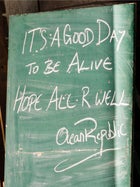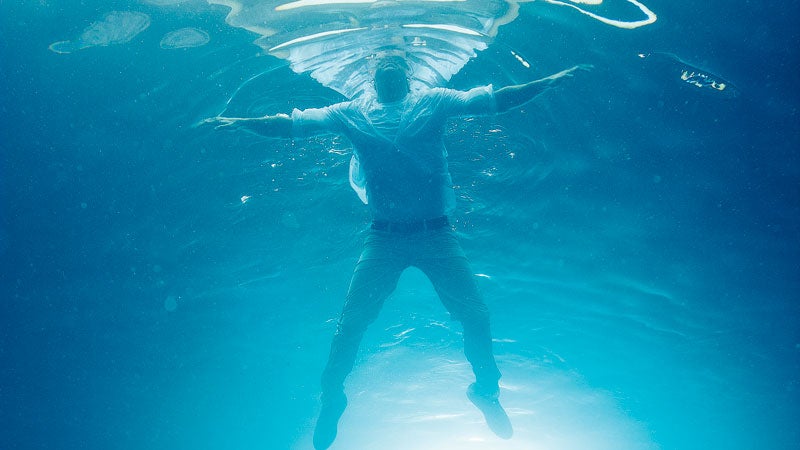Overcoming a natural or man-made disaster isn’t something most of us plan for when we book a trip. But being prepared for just about any scenario (from hurricanes to riots) can not only save your vacation—it might just save your life. How five ordinary travelers fared in five extreme situations:
 Survivors celebrate being rescued from the collapsed PGG-Wrightson in central Christchurch, New Zealand after a 6.3 earthquake on February 22, 2011.
Survivors celebrate being rescued from the collapsed PGG-Wrightson in central Christchurch, New Zealand after a 6.3 earthquake on February 22, 2011. A chalkboard in Boracay, Philippines, shortly after the passing of Super Typhoon Haiyan.
A chalkboard in Boracay, Philippines, shortly after the passing of Super Typhoon Haiyan.Earthquake
When Lara Giles met a friend for lunch on February 22, 2011, they hadn’t even made it to the Christchurch restaurant before the ground started to shake. Giles, who was visiting New Zealand from Great Britain, was unfamiliar with earthquake safety precautions and started to run. She was intercepted by a local who ordered her into a doorway and told her to “drop, cover, and hold” to shelter herself from crashing debris.
When the quaking stopped, Giles said she had no idea what to do next. “It looked as if a bomb had been detonated,” she says. “The apartment block next to where we were standing had collapsed.” Mobile phone circuits were overwhelmed and she had no way of reaching her nine-year-old daughter who was with family in the city’s outskirts.
Staying Safe
In hindsight, Giles should have stored nonperishable food and water in her rental car. “We didn’t have much in our motel, and the tap water was contaminated,” she says. Giles, who was visiting Christchurch with the thought of emigrating but opted for shake-free Brisbane, Austrailia, instead, has since made a few changes to the way she travels. She now keeps essentials, such as travel documents, phone numbers, car keys, and emergency money on hand, and she’s buffed up on her first aid skills. She and her family also have also discussed how to find each other if they ever lose communication.
Super Typhoon
A super typhoon was the last thing Hamden, Connecticut, author Norm Schriever expected when he arrived in the remote beach community of Boracay in October 2013. The Philippines (unlike other regions) doesn’t have a predictable cyclone season, so when Schriever noticed storm comments on social media, he began tracking the weather obsessively. “The numbers were impossible–300-kilometer-per-hour winds and 25-foot seas,” he says. Schriever says when the storm, named Haiyan, became imminent he tried to catch a ferry off the island, but there were hundreds of people at the terminal ahead of him. Then the Coast Guard suspended the rest of the sailings.
Staying Safe
A savvy traveler, Schriever prepares for every trip by emailing himself vital information such as pin numbers, medical insurance, and passport information, which allows him to access the information from anywhere. He also carries a backpack of essentials and makes a point of knowing where the hospital, police department, and local storm shelters are. With the storm approaching, he charged his electronics, wrote an update for friends and family, and headed to the ATM to take out as much cash as possible. Then he stocked up on water, food, flashlights, toiletries, lighters, and candles—as well as rum and cigarettes to use for trading—and hunkered down in his third floor apartment.
Schriever says he was one of the only foreigners with a local SIM card who could get internet on his phone. “So I started posting updates about the condition of the island, and trying to connect people here with their loved ones abroad, to let them know they were safe and OK,” he says.
Street Protest
The Gifford family, from Bainbridge Island, Washington, was five years into an idyllic round-the-world sailing trip when they arrived in Thailand. Not long after Christmas, Behan Gifford started to hear rumblings about political protests and street violence in Bangkok. She was unable to gather local news due to the language barrier and unreliable internet, so she enlisted a politically savvy friend back home to send daily updates. The Giffords also started talking to local people. “We’d ask tuktuk drivers, the lady we bought vegetables from, and whoever we could share enough language with: What do you think about the situation? Do you think it could turn violent?”
Staying Safe
As the unrest grows, the Gifford family—who is still in Thailand—has strengthened ties to locals. “Be known, be friendly,” Behan says. “If you're in need of warning, someone who you've shown kindness will probably return the same.” The Giffords also steer clear of areas with political activity and decided on a multi-level exit strategy, from carrying a phrasebook and paper street map so they can navigate away from protests, to ducking into shops and alleys if the situation seems dangerous. They even have a plan for getting out of the country. “We’re fortunate that Malaysia is only a few days sail away.” They’re also paying closer attention to the U.S. Embassy’s advice, which encourages visitors to plan ahead by keeping a week's supply of cash, a full charge on mobile devices, and stocking a two-week supply of essentials such as food, water, and medicine.
Wildfire
While hundreds of campers were recently evacuated from fires on Stradbroke Island in Queensland, Australia, local Liza Armstrong recalled her family’s own brush with wildfire a year earlier. The Armstrongs had ventured to Tasmania for a two-week holiday, when “we listened to the radio and discovered the place we were meant to go was blocked by fire,” she says. Not ready to abandon her holiday, Armstrong began looking for a safe alternative. The family set off for the new destination, keeping their headlights on through the smoke and monitoring conditions as they traveled.
Staying Safe
Australia’s normal bush fire season lasts four to six months and can be extended by a month or two either side during periods of drought—making fire a fact of life in the steamy country. Bruno Greimel, from Rural Fire Service Queensland, says this means travelers should store safety gear in their cars (water, food, heavy clothes) and keep themselves informed. Dozens of fires can be burning at any one time, and grassfires can spread quickly and jump highways.” Greimel says visitors should also make themselves aware of fire bans that can restrict the use of barbecues and campfires.
Polar Vortex
When Taylor Kennedy started his journey from his home in Victoria, British Columbia, to a photo seminar in Washington, D.C., he thought the early January weather might be a problem and checked in with his airline. Reassured that “all was clear,” he set off on the first leg to Calgary, Alberta, only to arrive and find the next flight was delayed. “Then at 1 a.m., it was cancelled,” he says.
Even before retrieving his checked bags, Kennedy started looking for a hotel. “I called a few and went back to the first one, which had a price of $110 two minutes before, but was now $169.” Kennedy, who ended up stranded for two days in frigid Calgary, was grateful he had adequate warm clothes. But other travelers he met didn’t: “One girl was going to the Philippines and didn’t have a jacket or warm shoes.”
Staying Safe
Disrupted air travel isn’t the only way travelers are caught off guard in record cold. Drivers often discover their cars aren’t adequately winterized, and in some cases don’t start. During winter months, car owners should keep the gas tank half full, change the oil, and check the tires and battery. An emergency kit, ice scraper, tire chains, jumper cables, and warm clothes should be stashed in the trunk, along with matches, bottled water, and snacks.
Apps for Safer Travel
- from the U.S. Department of State is a free app that provides country information, travel alerts, travel warnings, maps, and U.S. embassy locations.
- gives information on how to find the closest embassy; the information is stored on your device in case you don’t have a connection.
- is just one of many apps created by a travel insurance company. Not only does it help you locate your policy details, it provides destination-specific information including language, laws, customs, and travel alerts.
- rather than having to remember the 911 equivalent number for every country, this app does it for you.
- provides an app that will help you prepare for and survive any disaster, from tornados to earthquakes.
- has a “Follow-Me” feature that shares your location with a select group of contacts if you’re concerned for your safety. It also has an SOS button that sends a panic alert with a link to your location.
- To keep your devices charged (while monitoring the radio and providing emergency light) throw an in your bag. The little device is powered by both a hand crank and solar panel.


